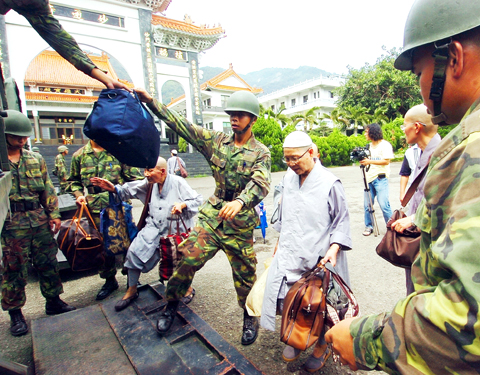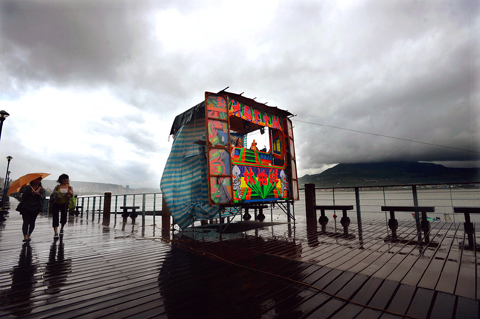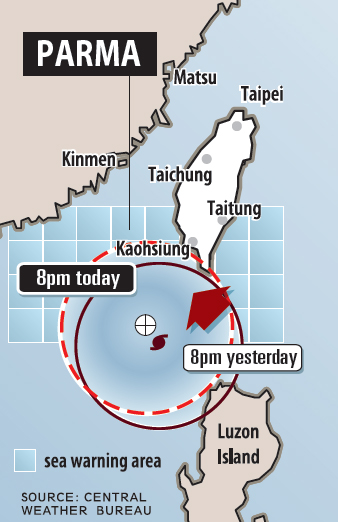The Central Weather Bureau (CWB) issued a land warning for Typhoon Parma in the Hengchun Peninsula yesterday and said the storm would bring strong winds and heavy rain as it made a slow approach north.
The weather system, with winds gusting up to 155kph, was 270km south of Oluanbi (鵝鑾鼻) as of 9:15pm, moving slowly in a north-northwesterly direction, the bureau said.
“The typhoon is forecast to move along the [northern] track until Monday night and then turn southwest,” CWB forecaster Hsiao Chia-sen (蕭家森) said. “In the next two to three days, the typhoon may move slowly and hover around the Bashi Channel.”

PHOTO: HUANG CHIH-YUAN, TAIPEI TIMES
He urged residents of Hengchun Township (恆春) to take precautions against powerful winds and rains.
Residents in northern and eastern parts of Taiwan should also be on guard against heavy rains brought by the typhoon, he said.
Authorities suspended air and sea links with outlying islands yesterday and about 55 international flights were either canceled or delayed.

PHOTO: LIN CHENG-KUNG, TAIPEI TIMES
The Directorate General of Highways was closely monitoring 60 highways, including roads leading to Alishan and the Southern Cross-Island Highway.
The roads would be closed if necessary, it said.
Following criticism of the government’s handling of Typhoon Morakot and its aftermath, authorities started evacuations in four central and southern counties on Saturday after the weather bureau said the typhoon could bring torrential rains and trigger landslides.

Evacuation from potentially hazardous areas — especially those devastated by Morakot — continued as strong winds and rain brought by the approaching typhoon began in parts of the country yesterday. Evacuation of more than 400 residents in Laiji Village (來吉) and Alishan Township (阿里山) in Chiayi County began early yesterday morning after the bureau issued the first land warning for Parma.
Laiji, as well as several other villages in the region, was completely cut off in August as all the roads leading to the mountainous village were damaged by mudslides triggered by rains brought by Morakot. The roads remained damaged for nearly a month and the villages relied on helicopters and manpower for food and other necessities.
Fearing a repeat scenario, residents in those parts of the country most devastated in August were more eager to evacuate this time, police and rescue workers said, adding that many had already left before evacuation orders were issued.
At press time, 440 Laiji villagers were staying in temples and army bases in Chiayi. The Chiayi County Government said it planned to evacuate 2,629 people and had set up 30 shelters across the country.
Meanwhile, the Kaohsiung County Government said it had evacuated more than 700 people from potentially hazardous areas including Liouguei (六龜), Taoyuan (桃源), Maolin (茂林), Jiasian (甲仙) and Namasiya townships.
People were also evacuated from Nantou, Pingtung and Taitung counties.
Although most people cooperated with evacuation orders, a 92-year-old woman in Shenmu Village (神木), Nantou County’s Sinyi Township (信義), initially refused to leave.
“I don’t want to leave, I’ve never left the village, it’s safe here,” the woman told the village chief and rescue workers when they visited her house and asked her to leave.
She only agreed after hours of persuasion by her children and grandchildren.
The Ministry of National Defense also deployed some 200 soldiers from elite units to remote villages while putting 35,000 on standby.
At a press conference held at the Central Emergency Operation Center yesterday, Premier Wu Den-yih (吳敦義) said he had told the Pingtung County Government to draw up measures to prevent people from surfing, fishing and watching the waves along the coast.
He said he had ordered the Water Resources Agency to cooperate with the Taitung and Pingtung county governments in dredging rivers in eastern Taiwan ahead of the typhoon.
Wu said President Ma Ying-jeou (馬英九) was very concerned about possible damage if the typhoon brought torrential rain.
The CWB dispatched 25 weather experts to assist local emergency operation centers, Wu said.
“If it turns out that the typhoon spares us, the entire country will have held a thorough [disaster prevention] drill,” Wu said.
“And if the typhoon does hit, we need to mitigate the damage it causes,” he said.
While the Taipei City Government has stockpiled sandbags for residents to keep floodwater from reaching their homes, Taipei Mayor Hau Lung-bin (郝龍斌) said it was unlikely that the city would declare a typhoon day today because the rainfall in Taipei had not exceeded the city’s standard for closing workplaces and schools — 78mm per hour.
At press time, Pingtung County’s Hengchun, Checheng (車城), Manjhou (滿州), Fangshan (枋山), Shihzih (獅子) and Mutan (牡丹) townships, Taitung County’s Daren Township (達仁) were the only ones declaring today a typhoon day, canceling work and classes.
Wu also warned of possible mudslides in Hualien after a major earthquake off the coast of Hualien early yesterday morning.
While the bureau put the magnitude at 6.3 on the Richter scale, the US Geological Survey said it was 6.1, after first gauging it at 6.2.
The survey said the quake, which struck at 1:36am yesterday, was centered about 29km south of Hualien.
It was strong enough to wake some people in Taipei.
“We do not have reports of casualties or damage,” an official from the CWB said.
The bureau warned residents in coastal areas to be on the lookout for large waves, but did not issue a tsunami warning.
“Judging from the [mudslide] situations after the 921 Earthquake [on Sept. 29, 1999], earthquakes could induce more landslides,” Wu said.

FREEDOM OF NAVIGATION: The UK would continue to reinforce ties with Taiwan ‘in a wide range of areas’ as a part of a ‘strong unofficial relationship,’ a paper said The UK plans to conduct more freedom of navigation operations in the Taiwan Strait and the South China Sea, British Secretary of State for Foreign, Commonwealth and Development Affairs David Lammy told the British House of Commons on Tuesday. British Member of Parliament Desmond Swayne said that the Royal Navy’s HMS Spey had passed through the Taiwan Strait “in pursuit of vital international freedom of navigation in the South China Sea.” Swayne asked Lammy whether he agreed that it was “proper and lawful” to do so, and if the UK would continue to carry out similar operations. Lammy replied “yes” to both questions. The

SECOND SPEECH: All political parties should work together to defend democracy, protect Taiwan and resist the CCP, despite their differences, the president said President William Lai (賴清德) yesterday discussed how pro-Taiwan and pro-Republic of China (ROC) groups can agree to maintain solidarity on the issue of protecting Taiwan and resisting the Chinese Communist Party (CCP). The talk, delivered last night at Taoyuan’s Hakka Youth Association, was the second in a series of 10 that Lai is scheduled to give across Taiwan. Citing Taiwanese democracy pioneer Chiang Wei-shui’s (蔣渭水) slogan that solidarity brings strength, Lai said it was a call for political parties to find consensus amid disagreements on behalf of bettering the nation. All political parties should work together to defend democracy, protect Taiwan and resist

By refusing to agree spending increases to appease US President Donald Trump, Spanish Prime Minister Pedro Sanchez threatened to derail a summit that NATO Secretary-General Mark Rutte needs to run smoothly for the sake of the military alliance’s future survival. Ahead of yesterday’s gathering in The Hague, Netherlands, things were going off the rails. European officials have expressed irritation at the spoiler role that Sanchez is playing when their No. 1 task is to line up behind a pledge to raise defense spending to 5 percent of GDP. Rutte needed to keep Spain in line while preventing others such as Slovakia

SHIFT PRIORITIES: The US should first help Taiwan respond to actions China is already taking, instead of focusing too heavily on deterring a large-scale invasion, an expert said US Air Force leaders on Thursday voiced concerns about the Chinese People’s Liberation Army’s (PLA) missile capabilities and its development of a “kill web,” and said that the US Department of Defense’s budget request for next year prioritizes bolstering defenses in the Indo-Pacific region due to the increasing threat posed by China. US experts said that a full-scale Chinese invasion of Taiwan is risky and unlikely, with Beijing more likely to pursue coercive tactics such as political warfare or blockades to achieve its goals. Senior air force and US Space Force leaders, including US Secretary of the Air Force Troy Meink and